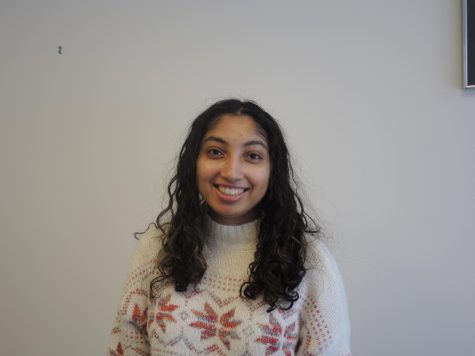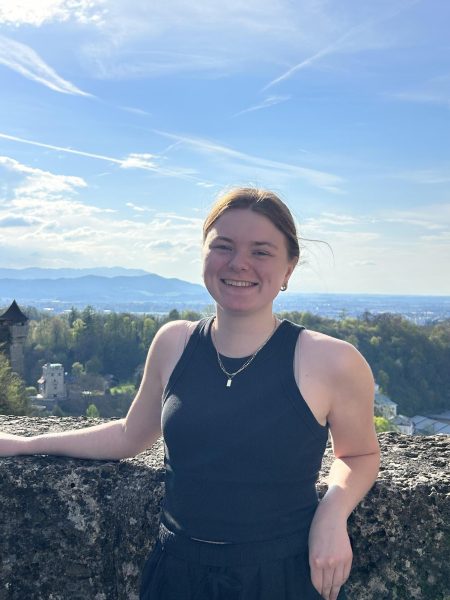MCSGoverseer: The LB meets with Rivera and Coquemont

December 1, 2022
On Tuesday, Nov. 21, Macalester College Student Government (MCSG) met for their second-to-last Legislative Body (LB) meeting of the semester. They spent the majority of the meeting discussing alternative grading models and preparing for a visit from senior leadership.
To start the meeting, representatives from two student organizations, Pride Athletes at Mac (PAM) and BIPOC Athletes (BIPOCa), presented their organizations to the LB. Both of their charters were passed.
Academic Affairs Committee (AAC) Chair Joel Sadofsky ’25 then led a discussion in partnership with the Student Services and Relations Committee (SSRC) regarding alternative grading models and methods. Sadofsky shared a spreadsheet that includes information on various professors at Macalester who employ alternative grading models and a document with ideas for inclusive and responsive classroom practices, encouraging those present to add ideas and circulate the document. Those present then broke into small groups to discuss.
For the remainder of the meeting, Financial Affairs Committee (FAC) chair Heaji Kang ’23 and MCSG President Bobbie Pennington ’24 led a brainstorming session in preparation for a visit from President Suzanne Rivera and Dean of Students Kathryn Kay Coquemont the following week.
After more small group discussion about potential issues and topics to raise to Rivera, one person from each group shared some of their ideas to the larger group. Issues that were brought up as potential topics of conversation included a clearer description of the president’s long and short term goals, class registration concerns and more transparency with senior leadership in general.
The meeting concluded with various committee and cabinet updates and reminders about the following week’s meeting. The following Tuesday, Nov. 29, MCSG met with Rivera and Coquemont to discuss questions surrounding student experiences.
The LB asked the two senior leadership members questions they created in collaboration with each other the previous week and which were curated by the MCSG Executive Board.
Pennington expressed his gratitude for Rivera and Coquemont coming to the meeting and working with MCSG.
“I’m really happy we get to have this conversation,” Pennington said. “It’s not often the case that student governments get to interact one-on-one or in this type of setting with the president or the dean of students at the same time, and so we are really grateful for both of you being here.”
Rivera and Coquemont then introduced themselves to the LB to discuss their roles in the college and their backgrounds that brought them here.
Rivera spoke on this being her third year at the college but feeling like her first as it is the first non-pandemic year where the college is operating more normally with in-person events. She also mentioned her personal goal in her role as the college’s president. “
I am a totally evangelical proselytizer about the value of higher education as a matter of opportunity in the United States,” Rivera said. “I know it doesn’t work for everyone, but for people who get the opportunity to go, it can be life changing. And the reason that I enjoy my job and find it fulfilling is because I get to be a part of making that opportunity available to other people.”
Rivera said she sees her role as providing leadership for students, faculty, staff and employees, fostering relations between the campus and Macalester’s alumni and raising the visibility and reputation of Macalester around the world.
The first content question posed by the LB was on the topic of how to improve transparency and interactions between students and the senior leadership team. Rivera talked about the informal and formal way that she engages with students.
Junior representative Emma Kopplin ’24 asked the next question about what Rivera sees as her role in the shared governance process and decision-making model.
“I think my role with regard to student government is to be a partner with student leaders to address issues or concerns that are important to students,” Rivera said.
“I think my responsibility is to be honest, to engage, to listen and then to make decisions that are in the best interest of the institution.” Rivera continued.
Senior representative, Emmanuel Keppel ’23 asked a question about international students’ concerns, specifically their inequalities with study away, financial aid and housing.
Both Rivera and Coquemont emphasized that helping international students is a huge goal of the senior leadership team that they hope to address in the rollout of the strategic plan.
Rivera mentioned that she would be having a meeting with a group of international students, Pennington, Coquemont, faculty and staff on Thursday, Nov. 29 to talk about urgent concerns and what the college could be doing better to support international students.
Coquemont discussed the work International Student Programs (ISP) is doing and how they are supporting their work by hiring another full-time employee and making health insurance more accessible for out-of-network use.
In response to questions regarding what senior leadership is doing to make study away more equitable for international students, Coquemont explained that those issues revolve around fundraising.
According to Rivera, financial aid is also a complex issue.
“I have concerns that it’s not completely transparent how financial aid packages get put together,” Rivera said. “And that there’s not a shared understanding on campus about what particular challenges domestic students with financial aid face, as opposed to the challenges international students with financial aid face.”
Year-round housing for international students was a repeated question, as the LB has been having discussions for weeks about winter housing. Rivera spoke on the college’s long-term plan, which is dependent on the strategic plan and how the college will use its campus year-round. Housing provided when school is not in session would necessitate staff availability at that time, along with money to hire workers and maintain spaces. Rivera said this would require actions like raising tuition or increasing philanthropy, creating an additional set of complications and problems.
Speaking on a more short-term note, Coquemont discussed how she has been working with Executive Director for Residential Life Kyle Flowers to collect data on how peer institutions bring these issues to senior leadership.
The next question asked how the college is working to resolve the issue of lack of all gender housing.
“[Our goal for] next fall [is] to be able to reverse the model [so that] people could request gender-specific housing,” Coquemont said.
According to Rivera, reverting the model would mean the default housing assignment would be non-gendered housing.
Coquemont emphasized that this is a top priority for everyone, including Rivera, who has been a passionate advocate for resolving this issue.
Junior representative Ellen Patrickson ’24 asked the next question about increased compensation for RAs and other student leaders, such as orientation leaders and MCSG members.
Coquemont expressed a desire to do so, but it is highly unlikely due to prioritization of other agendas. It is also very complex, as increasing the pay for some jobs would mean they all have to be increased, and there are over a dozen jobs that the college does not have the budget to offer more financial support.
“What is voluntary leadership because you’re a good community member and you’re passionate about something, and what is paid leadership?” Coquemont asked the LB.
The last questions focused on the staff and faculty, what the process of hiring tenure track professors looks like and what Macalester has done to increase equity. Rivera suggested that the LB talk to Provost Lisa Anderson Levy about the specific process.
“The number of domestic faculty of color and international faculty has been high,” Rivera said. “And over time, that’s going to change the face of the professoriate at Macalester.”
The last few minutes were reserved for Rivera and Coquemont to ask the LB questions. Rivera asked, “what do you need from me and senior leadership that you feel like you are not getting?”
Many members of the LB asked for more opportunities for MCSG and the wider student body to talk to senior leadership.
“After last year’s sit-in, there were promises of continuous conversations,” Kopplin said. “Continue those types of conversations, [creating] those spaces with more frequency, it might [make it] not turn into something as heated and tense as last year’s event was.”
Rivera thanked the LB for their helpful comments and asked for MCSG’s support in creating events for students to talk to senior leadership more informally.
“Any forum that involves students interacting with the senior staff, from my perspective, would be more successful if it’s offered in partnership with students,” Rivera said. “As opposed to a top-down approach.”













